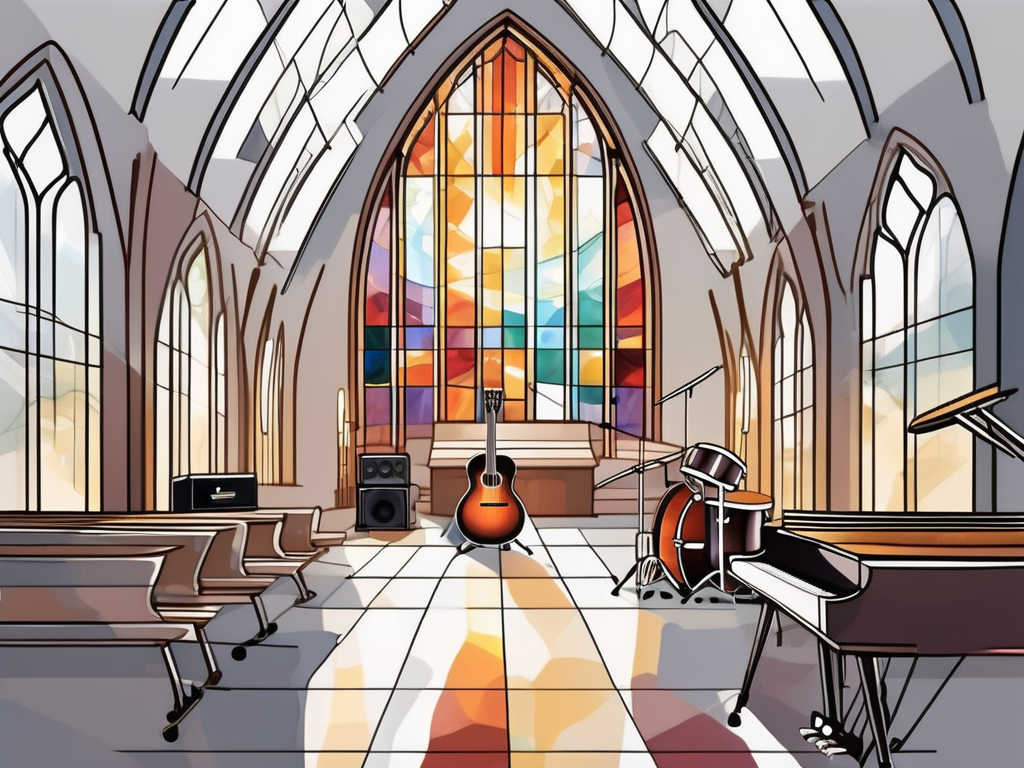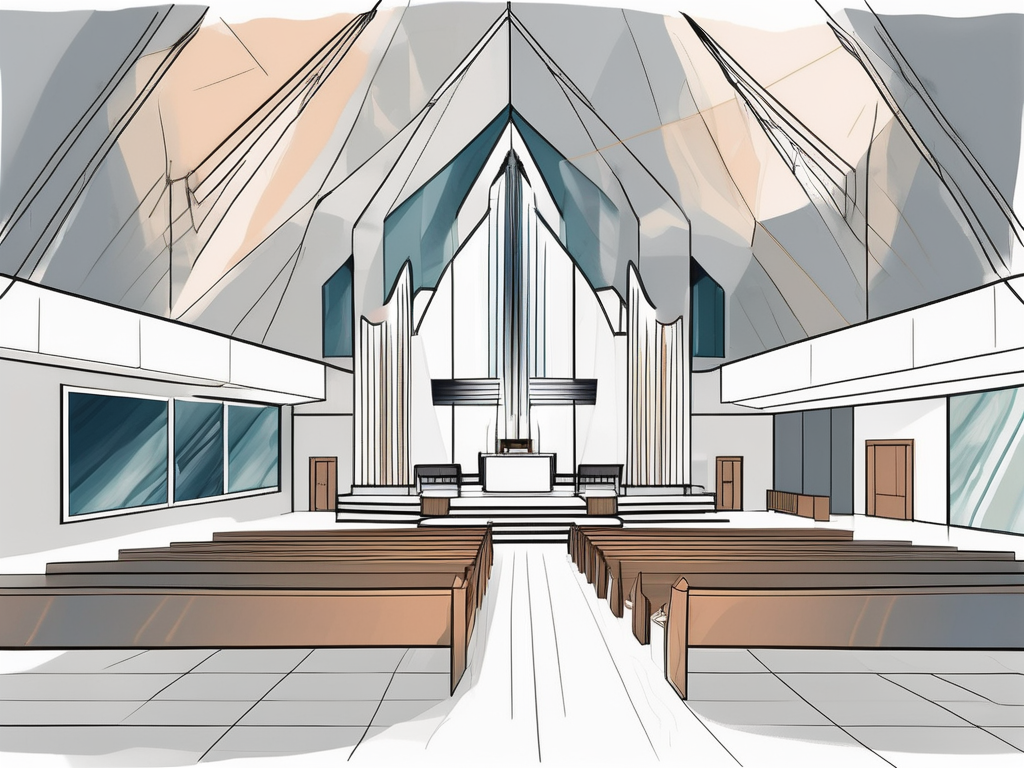In today’s fast-paced and ever-changing world, many individuals are searching for a sense of meaning and connection. The concept of modern spirituality has gained prominence as a way for people to explore their inner selves and find solace in a hectic world. This article aims to delve into the various aspects of modern spirituality, its role in contemporary society, the intersection of spirituality and technology, diverse perspectives, and the future of this fascinating phenomenon.
Understanding the Concept of Modern Spirituality
Modern spirituality is a multifaceted concept that encompasses a wide range of beliefs and practices. It can be loosely defined as the personal quest for a deeper understanding of oneself and connection to something greater than oneself. Unlike traditional religious frameworks, modern spirituality is not bound by specific dogmas or rituals. It allows individuals to explore and adapt their spiritual journey according to their unique preferences and needs.
One of the key characteristics of modern spirituality is the emphasis on inner growth and self-awareness. It encourages individuals to look within themselves to find answers, rather than relying solely on external authorities or doctrines. This self-empowering approach resonates with many who seek a more personalized and authentic spiritual experience.
Modern spirituality is a rich tapestry of practices and beliefs that have evolved over time. Let’s delve deeper into some of the defining aspects of this fascinating concept.
Defining Modern Spirituality
Defining modern spirituality is a complex task due to its diverse nature. It can encompass practices such as meditation, mindfulness, yoga, and energy healing, among others. These practices provide individuals with tools to cultivate inner peace, mindfulness, and a deeper connection to themselves and the world around them.
Modern spirituality also includes exploring esoteric philosophies, indigenous wisdom, and seeking connections with nature and the cosmos. Many individuals find solace and inspiration in ancient wisdom traditions, such as Buddhism, Taoism, and Native American spirituality. These traditions offer profound insights into the interconnectedness of all beings and the importance of living in harmony with nature.
Furthermore, modern spirituality goes beyond the individual realm and extends to how individuals relate to the world around them. It emphasizes the importance of compassion, empathy, and social responsibility as fundamental aspects of a spiritual life. This approach recognizes that spirituality is not an isolated pursuit but a way to foster positive change in society. It encourages individuals to actively engage in acts of kindness, social justice, and environmental stewardship.
The Evolution of Spirituality in Modern Times
The evolution of spirituality in modern times has been influenced by various factors, including advancements in science, globalization, and the erosion of traditional religious institutions. As scientific discoveries have challenged long-held beliefs, many individuals have sought alternative ways to make sense of their existence and find meaning in a seemingly random universe.
Globalization has also played a significant role in shaping modern spirituality. The exchange of ideas and cultural influences has led to the integration of diverse spiritual practices, philosophies, and traditions. This blend of East and West, ancient and contemporary, has given rise to a rich tapestry of spiritual perspectives. It allows individuals to draw inspiration from various sources and create a unique spiritual path that resonates with their personal beliefs and values.
Additionally, the decline in traditional religious institutions has created a void that modern spirituality seeks to fill. People are increasingly turning away from rigid religious structures and seeking a more flexible and individualized approach to their spiritual journeys. Modern spirituality provides a space for individuals to explore their beliefs, connect with like-minded communities, and find support and guidance on their path.
In conclusion, modern spirituality is a dynamic and ever-evolving concept that offers individuals the freedom to explore and define their spiritual journeys. It encompasses a wide range of practices, beliefs, and philosophies that empower individuals to cultivate self-awareness, compassion, and a deeper connection to themselves and the world around them. Whether through meditation, yoga, or embracing ancient wisdom traditions, modern spirituality provides a pathway for individuals to embark on a transformative journey of self-discovery and personal growth.
The Role of Spirituality in Contemporary Society
The role of spirituality in contemporary society extends beyond personal well-being and introspection. It has far-reaching implications for various aspects of our lives, including mental health, the workplace, community building, and even the environment.
In today’s fast-paced and often chaotic world, spirituality offers a sanctuary for individuals seeking solace, meaning, and connection. It provides a framework for understanding the deeper aspects of life and offers guidance on how to navigate the complexities of our existence.
Spirituality and Mental Health
The connection between spirituality and mental health has gained significant attention in recent years. Numerous studies have shown that spiritual practices, such as meditation and mindfulness, can have profound effects on mental well-being.
Engaging in spiritual practices can reduce stress, improve mood, and increase resilience in the face of adversity. It allows individuals to cultivate a sense of inner peace and harmony, which positively impacts their overall psychological well-being.
Spirituality also provides individuals with a sense of purpose and meaning, contributing to their mental health. It offers a broader perspective beyond the materialistic and superficial aspects of life, allowing individuals to find deeper fulfillment and satisfaction.
Spirituality in the Workplace
The inclusion of spirituality in the workplace is a growing trend that recognizes the importance of addressing the holistic needs of employees. Organizations are beginning to understand that fostering spiritual well-being can lead to a more engaged and productive workforce.
Workplace spirituality involves creating an environment that supports personal growth, ethical decision-making, and a sense of interconnectedness. It encourages employees to bring their whole selves to work, integrating their spiritual beliefs and values into their professional lives.
Companies that embrace spirituality in the workplace often experience numerous benefits. Increased employee engagement, improved teamwork, and enhanced organizational culture are just a few of the positive outcomes. By acknowledging and supporting the spiritual dimensions of employees, organizations can create a more fulfilling and meaningful work experience.
Spirituality and Community Building
Spirituality has the power to bring people together and foster a sense of community. In an increasingly fragmented society, the pursuit of spiritual growth provides an avenue for individuals to connect with like-minded others.
Through collective spiritual practices and shared values, communities can nurture social cohesion and create spaces for personal and collective transformation. Spiritual communities offer support, inspiration, and a shared sense of purpose, allowing individuals to feel a sense of belonging and connection.
Moreover, spirituality becomes a catalyst for positive social change as individuals join forces to address societal issues and promote greater understanding and compassion. These communities often engage in various initiatives, such as environmental conservation, social justice, and humanitarian efforts, to create a more harmonious and sustainable world.
In conclusion, spirituality plays a multifaceted role in contemporary society. It not only contributes to personal well-being and introspection but also has implications for mental health, the workplace, community building, and social change. By embracing spirituality, individuals can find a deeper sense of purpose, connection, and fulfillment in their lives, while collectively working towards a more compassionate and harmonious world.
The Intersection of Spirituality and Technology
As technology continues to advance at an unprecedented pace, it is inevitable that it intersects with spirituality. The digital age has ushered in new possibilities for spiritual exploration and practice.
In today’s fast-paced world, where people are constantly connected to their devices, technology has become an integral part of our lives. It has transformed the way we communicate, work, and even seek spiritual fulfillment. The intersection of spirituality and technology has opened up a world of opportunities for individuals to connect with their inner selves and explore the depths of their spirituality.
Digital Platforms for Spiritual Practices
A plethora of digital platforms have emerged to support individuals in their spiritual journeys. These platforms offer guided meditations, virtual yoga classes, and access to spiritual teachers from around the world. They provide a means for people to connect with spiritual wisdom and practices regardless of their geographic location.
Imagine being able to join a virtual meditation session led by a renowned spiritual teacher from the comfort of your own home. These digital platforms have made it possible for individuals to access spiritual guidance and teachings that were once limited to specific locations or communities.
Furthermore, social media platforms have become a virtual gathering place for like-minded individuals to share their spiritual experiences and insights. Online communities dedicated to spirituality offer a sense of belonging and provide a space for individuals to learn from one another.
Through these digital platforms, individuals can connect with a global community of spiritual seekers, fostering a sense of unity and shared purpose. The exchange of ideas and experiences on these platforms can lead to profound personal growth and transformation.
The Impact of Technology on Spiritual Experiences
Technology has also influenced the way people experience and express their spirituality. Virtual reality and augmented reality have the potential to create immersive spiritual experiences, allowing individuals to embark on virtual pilgrimages or explore sacred spaces without physically being there.
Imagine putting on a virtual reality headset and finding yourself transported to the ancient temples of Angkor Wat or standing in awe before the majestic beauty of the Grand Canyon. These technological advancements have the power to evoke a deep sense of awe and wonder, enhancing spiritual experiences in ways that were previously unimaginable.
Moreover, technology has expanded the accessibility of spiritual knowledge. With a few clicks, one can access ancient texts, spiritual teachings, and diverse perspectives that were once limited to the few who had access to physical copies. Online libraries and digital archives have made it possible for individuals to explore various spiritual traditions and philosophies, broadening their understanding of the world and their place in it.
Technology has also made it easier for individuals to incorporate spiritual practices into their daily lives. Mobile apps offer guided meditations, mindfulness exercises, and reminders to practice gratitude, helping individuals stay connected to their spirituality amidst the demands of modern life.
While there are concerns about the potential drawbacks of technology on spirituality, such as the potential for distraction or disconnection from the present moment, it is undeniable that technology has opened up new avenues for spiritual growth and exploration.
In conclusion, the intersection of spirituality and technology is a fascinating and ever-evolving field. As technology continues to advance, it will be interesting to see how it shapes and enhances our spiritual experiences. Whether it is through digital platforms, virtual reality, or access to spiritual knowledge, technology has the potential to deepen our connection with ourselves and the world around us.
Diverse Perspectives on Modern Spirituality
Modern spirituality transcends religious boundaries and encompasses a wide range of beliefs and practices. It is inclusive and acknowledges that people find meaning and connection through various avenues.
Spirituality Beyond Religion
Modern spirituality recognizes that spiritual experiences can be found outside the confines of organized religion. It embraces the idea that individuals can cultivate a deep sense of spirituality without adhering to specific religious dogmas. For many, spirituality is a deeply personal and internal journey that does not require external validation or affiliation.
This inclusivity allows individuals to explore and draw inspiration from multiple traditions and philosophies, creating a tapestry of beliefs that is uniquely their own.
Spirituality in Non-Western Cultures
Modern spirituality also recognizes the richness of spiritual practices found in non-Western cultures. It acknowledges that indigenous wisdom, Eastern philosophies, and other ancient traditions offer valuable insights into the human experience and our connection to the world.
By embracing these diverse perspectives, modern spirituality expands its horizons and encourages a global outlook that respects and values the contributions of all cultures.
Spirituality in the Youth
The younger generations are increasingly shaping the landscape of modern spirituality. This demographic seeks spirituality that is relevant to their unique experiences and challenges. They are often drawn to social justice causes, environmental activism, and mindfulness practices.
For many young people, spirituality provides a framework for personal growth, social engagement, and well-being. They see spirituality as a means to create a more just and sustainable world.
The Future of Spirituality
As we look to the future, the evolution of spirituality is likely to continue, driven by societal changes and emerging trends. Here are some predictions and possibilities that may shape the future of spirituality.
Predictions and Possibilities
One possible future is the integration of spirituality and science. As scientific discoveries reveal the interconnectedness of all things, there is a growing recognition that spirituality and science can coexist. This integration may lead to new insights and practices that bridge the gap between the material and the spiritual.
Furthermore, advancements in technology may enable even more immersive spiritual experiences. Virtual reality, artificial intelligence, and biofeedback technologies may offer new ways to explore consciousness and deepen our understanding of spirituality.
Spirituality and Sustainability
The need for a more sustainable and harmonious world may drive spirituality towards a greater focus on environmental stewardship and social justice. Spirituality can inspire individuals and communities to take action to protect the planet and ensure a just and equitable future for all.
In this future, spirituality may evolve to address ecological concerns and foster a deep reverence for the interconnectedness of all life.
The Role of Spirituality in Global Peace and Harmony
Finally, spirituality may play a pivotal role in fostering global peace and harmony. As the world becomes increasingly interconnected, there is a growing recognition of the need for a more inclusive and compassionate worldview.
Spirituality has the potential to transcend cultural, religious, and ideological boundaries, promoting understanding and empathy among diverse communities. By cultivating inner peace and compassion, individuals can contribute to the creation of a more peaceful and harmonious world.
In conclusion, modern spirituality offers a personal and flexible approach to exploring the deeper aspects of life. It encompasses diverse practices, perspectives, and beliefs, enabling individuals to embark on their own unique spiritual journeys. Moreover, spirituality has far-reaching implications for mental health, the workplace, and community building. As technology continues to evolve, it intersects with spirituality, offering new possibilities for exploration and expression. The future of spirituality holds many exciting possibilities, from the integration of spirituality and science to the role of spirituality in creating a more sustainable and peaceful world. As we navigate the complexities of modern life, the essence of modern spirituality serves as a guiding light, offering solace, connection, and a sense of purpose in our ever-evolving world.











